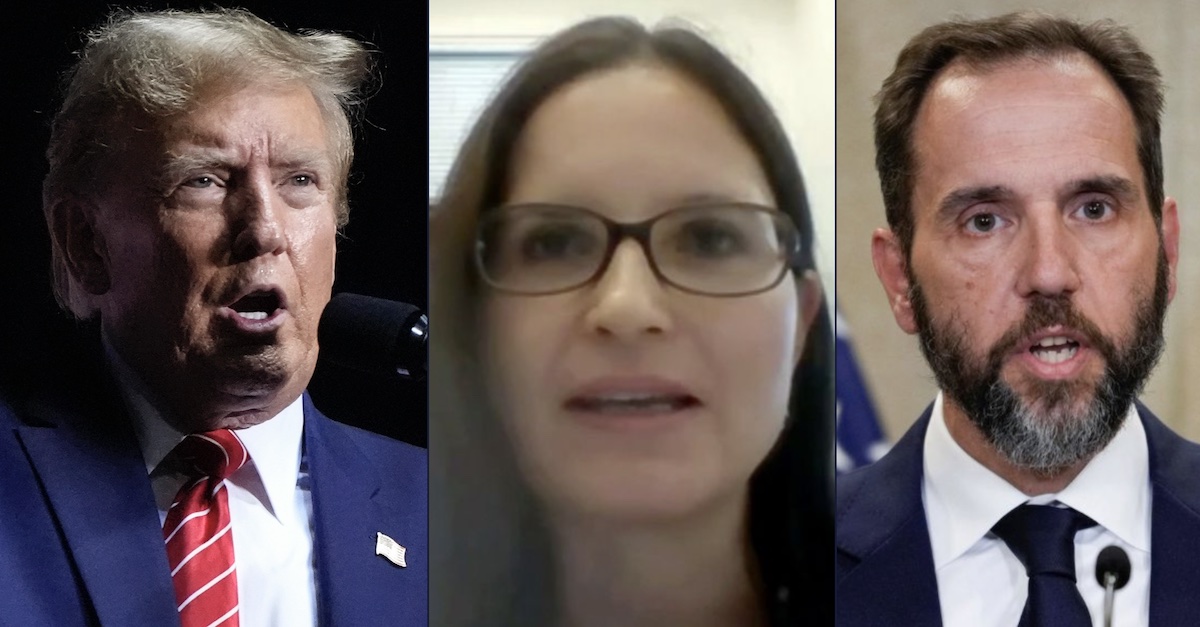

Left: Donald Trump (AP Photo/Mike Stewart), File); Center: U.S. District Judge Aileen Cannon (U.S. Senate); Right: Special counsel Jack Smith (AP Photo/J. Scott Applewhite, File)
The judge overseeing Donald Trump’s Mar-a-Lago classified documents case has given a big hint as to how she will analyze, if not how she will rule on, a defense effort to dismiss the case over allegations that special counsel Jack Smith was unlawfully appointed.
In February, Trump’s defense filed a 16-page motion to dismiss, arguing the special counsel’s office was created in violation of the appointments clause of the U.S. Constitution and funded in violation of the appropriations clause. The motion argues the proper remedy for such alleged violations is the dismissal of the entire indictment.
Since then, however, the U.S. Supreme Court has delved into similar appropriations issues – by upholding Federal Reserve funding of the Consumer Financial Protection Bureau (CFPB). That case, notably, did not encapsulate any questions related to the appointments clause.
Still, U.S. District Judge Aileen Cannon would like to talk about it.
Titled, “President Trump’s Motion to Dismiss the Indictment Based on the Unlawful Appointment and Funding of Special Counsel Jack Smith,” the brief largely repeats arguments that have failed to remove authority from a special counsel in the past – specifically Robert Mueller during the long-drawn-out Russiagate investigation.
A hearing over Trump’s motion to dismiss is slated to occur on June 21. By June 11, the court wants the prosecution and the defense to submit supplemental briefs “on what impact, if any, the Supreme Court’s decision” in the pro-CFPB case has on the appropriations clause argument. The judge gave the parties a 15-page limit on those arguments – “exclusive of title/certificates, etc.”
The judge specified what one section of the briefs should address:
The parties’ supplemental briefs also should clarify, in a separate section, what appears to be the position set forth in the parties’ submissions—i.e., that no factual development is warranted or necessary to resolve either of the two challenges raised in the Motion, because the extent of the Special Counsel’s authority and status is delimited and evaluated by the statutory and regulatory authorities cited in Appointment Order No. 5559-2022 (for purposes of the Appointments Clause challenge), and by that same Appointment Order and the cited Department of Justice Appropriations Act (for purposes of the Appropriations Clause challenge).
In other words, Cannon is asking Trump’s team and Smith’s team to specifically opine on why they both, in the court’s read of the case, seem to agree that the legal discussion should be limited to two documents created by the U.S. Department of Justice.
Before and after the high court’s ruling in favor the CFPB – an agency created during the Obama administration in response to the bad behavior that precipitated the 2008 financial crisis – earlier this month, Cannon also allowed several groups of lawyers and legal commentators to file friend-of-court briefs over Smith’s appointment.
In March, the judge allowed Edwin Meese III, the 75th U.S. attorney general who was appointed by then President Ronald Reagan, Federalist Society co-founder and Northwestern University law professor Steven Calabresi, Boston University law professor Gary Lawson, and the infamous interest group Citizens United to submit arguments in support of Trump.
Smith fired back in March by calling those arguments “meritless” and doomed to fail, as they have in “every court.”
Earlier on Wednesday, the court granted an unopposed motion to add Michael Mukasey, the 81st U.S. attorney general who was appointed by George W. Bush, as an amicus curiae in favor of the Trump position on the appointments and appropriations clauses dispute.
Cannon wants to give those amici an opportunity to address the arguments she is demanding from the state and the defendant.
“The Court also authorizes (but does not require) the three already-approved amici on the Motion–and only those amici–to file, by the June 11, 2024, deadline, supplemental briefs limited reasonably to the factual-development question raised above, not to exceed 10 double-spaced pages (exclusive of title/certificates, etc.),” the court’s order reads.
Matt Naham contributed to this report.
Have a tip we should know? [email protected]


